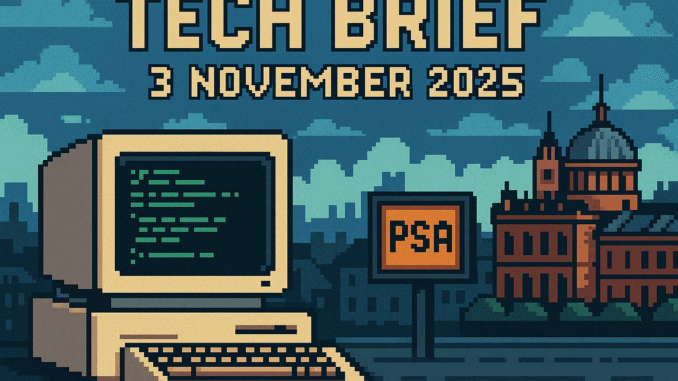
Tech Brief 3 November 2025 opens with open source in the UK public sector, global chip supply headaches, and a look back at how a stray dog in orbit changed technology. It is not the busiest Monday, but there is substance for anyone with a soldering iron or a BBC Micro in the loft. Missed yesterday’s Tech Brief? Catch up here before diving in.
OpenUK and UKRI Issue New Guidance on Open Source for the Public Sector
“It took decades, but someone has finally written the manual for government open source.” OpenUK and UK Research and Innovation (UKRI) have partnered on a new policy document aimed at boosting public sector use of open source software. The guidance is direct, outlining benefits, risk management, and procurement best practices in plain English. It is a technical signpost, not a political one. This matters because UK public services have often lagged behind grassroots innovation, even as many British volunteers contributed to the global FLOSS (Free/Libre Open Source Software) movement. Archive forum posts show that calls for transparency and modifiability predate the current digital government push. The new document does not mention specific hardware, but anyone who has tinkered with a Pi or rescued an old ICL terminal from landfill knows the job is never just about code. The guidance quietly legitimises the DIY spirit in public IT: if the council can run open source, what’s stopping your local history group?
Nexperia’s China Sanctions Begin to Squeeze Global Car Production
Chip maker Nexperia, with a history stretching back to Philips and Ferranti, has now halted supplies to China after new sanctions. Analysts warn that this could send ripples through car manufacturing lines from Sunderland to Germany, as global supply chains face limited alternatives. Miniature power devices and logic chips, often hiding deep in control circuitry, remain at risk. This is not just corporate posturing. In the retro scene, supply problems with critical silicon shaped entire platforms. Service logs from the 1980s detail the misery of tracking a single failed chip for months. Today’s engineers make do with cloned parts, reconditioned ICs, or, in classic British fashion, a well-aimed soldering iron. The car industry is finding itself in familiar territory. Readers with a background in repair might see a parallel with the time you cannibalised a dead ZX Spectrum just to get the ULA.
Why Is iPhone Autocorrect Acting Up? Users Say It’s Ducking Annoying
Is there anything more distracting than typing “meeting at mine” and autocorrect offering something that sounds like a forgotten Amstrad command? Since the latest iOS update, autocorrect has been throwing oddball substitutions for ordinary words. Apple’s forums are awash with complaints, mostly from people making precisely the sort of typo that makes old T9 keypads look like a luxury. The company acknowledged the issue but remains vague on when to expect a fix, and the speculation is all over the place. Some blame shifting language models; others point fingers at on-device learning gone haywire. In the early days, we just nudged misbehaving computers with the reset button. Now the problems hide deeper and do not respond to percussive maintenance. Have you experienced an autocorrect disaster? For some, it is almost nostalgic, if only in the “why do we still put up with this?” sense.
From the Wayback Machine
On This Day: 1957: Sputnik 2 and Laika’s Launch
Sixty-eight years ago, the Soviet Union launched Sputnik 2, carrying Laika the dog, from Baikonur Cosmodrome. It was the first spacecraft to carry a living being into Earth’s orbit. The craft entered an elliptical orbit ranging from 212 km to 1,660 km altitude, and the total weight was nearly 8 tonnes, rocket stage included. Sergei Korolev’s design included radio, temperature sensors, and a life-support module for Laika. She survived only a few hours before overheating ended the experiment, but the mission gave engineers priceless data about biology in space. Ethical debate followed, increasing as the story spread in international press. Sputnik 2 set the precedent for both rapid prototyping and honest reckoning with consequences, still a lesson worth revisiting. Today’s fearless tinkerers owe much to these makeshift breakthroughs, even if most of us prefer to keep our labs pet-free.
What This Means
For Tech Brief 3 November 2025, genuine progress is not just a matter of shiny apps or new acronyms. The same puzzles, how to foster openness, where to find components, whose mistakes matter: just wear different costumes. We keep documenting the shifting landscape because sometimes the past is the only toolkit that fits.
May your kit stay mended, your autocorrect stay humble, and your search for rare chips always pay off. Stay curious.
Missed yesterday’s Tech Brief? Catch up here

Leave a Reply